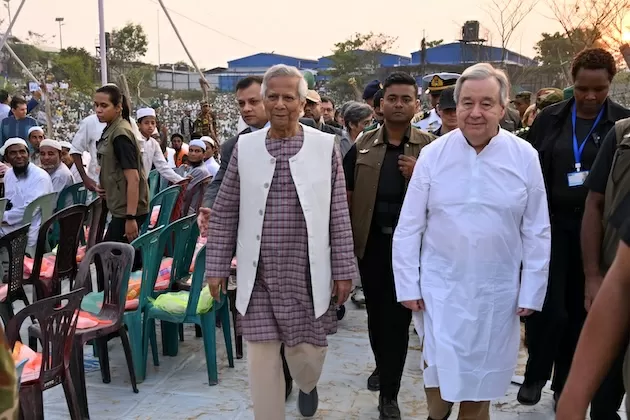United Nations Secretary-General António Guterres recently made a heartwarming gesture towards the Rohingya refugees when he joined them in an iftar party at the Ukhiya refugee camp. Dressed in a traditional white panjabi, a costume of Muslims, Guterres showed his solidarity with the long-suffering Rohingya people. As he waved to thousands of refugees who had gathered to welcome him, it was clear that his presence was a symbol of hope and determination to address the plight of the Rohingya people.
The Rohingya people, a minority ethnic group from the Rakhine state in Myanmar, have been facing persecution and violence for decades. In August 2017, a brutal military crackdown forced more than 700,000 Rohingya people to flee to Bangladesh, seeking refuge and asylum. Since then, they have been living in overcrowded refugee camps with limited access to basic necessities, facing ongoing challenges and uncertainty about their future.
Amidst this dire situation, Guterres’ visit to the Ukhiya refugee camp was a ray of hope for the Rohingya people. As he joined them in breaking their fast during the holy month of Ramadan, his simple but powerful gesture showed that the world has not forgotten the suffering of the Rohingya people. In fact, Guterres himself expressed his deep concern, saying: “The Rohingya people have faced unimaginable horrors. They continue to live in appalling conditions, in makeshift camps with little access to education, health care, and other essential services.”
Guterres’ visit also highlighted the importance of standing in solidarity with the Rohingya people. As the Secretary-General of the United Nations, he has a crucial role in bringing attention to such humanitarian crises and urging the international community to take action. By wearing the traditional white panjabi, Guterres not only showed respect and acceptance of the Rohingya culture, but he also sent a powerful message that the United Nations stands with them in their struggle for justice and human rights.
The iftar party was not only a show of solidarity, but it also provided an opportunity for Guterres to listen to the stories and experiences of the Rohingya people. He met with families, children, and community leaders, hearing firsthand the harrowing tales of displacement, loss, and suffering. Guterres acknowledged the resilience and courage of the Rohingya people and assured them that the United Nations remains committed to finding a sustainable solution to their plight.
Guterres’ visit to the Ukhiya refugee camp and his participation in the iftar party was a reminder that amidst the darkness, there is still light and hope. It was a recognition of the strength and resilience of the human spirit, even in the face of such adversity. The gesture of wearing the traditional white panjabi was a powerful symbol of unity, breaking down the barriers between different cultures and backgrounds.
The Rohingya people, who have faced so much discrimination and violence, were undoubtedly moved and grateful for Guterres’ presence. They expressed their appreciation and gratitude, waving and cheering as Guterres walked among them. For the refugees who had been fasting during Ramadan, this was not just a meal, but a moment of hope and solidarity from the Secretary-General of the United Nations.
In conclusion, Guterres’ appearance in a traditional white panjabi at the iftar party in the Ukhiya refugee camp was a moment that will be remembered by the Rohingya people for years to come. It was a gesture that spoke louder than words, showing the world that the United Nations is committed to standing with the Rohingya people in their struggle for justice and human rights. May this visit serve as a reminder that we must continue to work towards finding a sustainable solution for the Rohingya people, and that solidarity and compassion have the power to bring about positive change.



